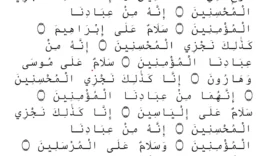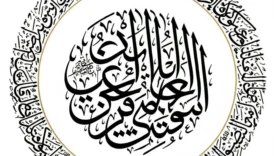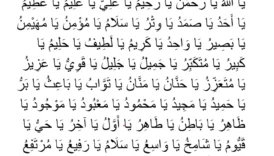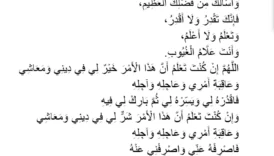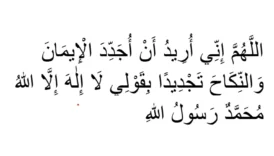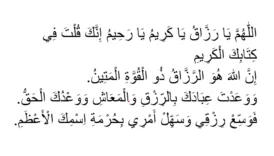A Healing Supplication Recommended by the Prophet (Peace Be Upon Him)
According to a narration passed down from Abū Sa‘īd and Abū Hurayrah (may Allah be pleased with them), the Prophet Muḥammad (peace be upon him) recommended a specific supplication (du‘ā’) to be recited during illness. It is reported that he said:
- A Healing Supplication Recommended by the Prophet (Peace Be Upon Him)
- 1. Text of the Du‘ā’ in Arabic and Transliteration
- Arabic Text
- Transliteration
- Approximate English Meaning
- 2. Significance of This Supplication
- 3. Recommendations for Recitation
- 4. Broader Context
- 5. Summary
- References
“Whoever recites this during their illness, and then (if it happens that) they pass away from that illness, the Hellfire will not harm them.”
(Reference: al-Ṭabarānī, al-Mu‘jam al-Kabīr; al-Haythamī, Majma‘ al-Zawā’id)
1. Text of the Du‘ā’ in Arabic and Transliteration
Arabic Text
لَا إِلٰهَ إِلَّا اللّٰهُ وَاللّٰهُ أَكْبَرُ
لَا إِلٰهَ إِلَّا اللّٰهُ وَحْدَهُ
لَا إِلٰهَ إِلَّا اللّٰهُ وَحْدَهُ لَا شَرِيكَ لَهُ
لَا إِلٰهَ إِلَّا اللّٰهُ لَهُ الْمُلْكُ وَلَهُ الْحَمْدُ
لَا إِلٰهَ إِلَّا اللّٰهُ وَلَا حَوْلَ وَلَا قُوَّةَ إِلَّا بِاللّٰهِ
Transliteration
Lā ilāha illallāhu wallāhu akbar.
Lā ilāha illallāhu waḥdah.
Lā ilāha illallāhu waḥdahū lā sharīka lah.
Lā ilāha illallāhu lahul-mulku wa lahul-ḥamd.
Lā ilāha illallāhu wa lā ḥawla wa lā quwwata illā billāh.
Approximate English Meaning
“There is no god but Allah, and Allah is the Greatest.
There is no god but Allah; He is alone (in His divinity).
There is no god but Allah; He alone has no partner.
There is no god but Allah; to Him belongs all sovereignty, and to Him belongs all praise.
There is no god but Allah; there is no power and no might except by (the permission of) Allah.”
2. Significance of This Supplication
- Spiritual Support During Illness
- Reciting this du‘ā’ fosters hope and reliance on God’s mercy during times of physical weakness.
- The narration adds a reassuring promise that if someone passes away after reciting it, they are spared from the torment of the Fire, reflecting a major spiritual incentive.
- Emphasis on Tawḥīd (God’s Oneness)
- Each line reiterates “Lā ilāha illallāh” (no god but Allah), affirming the oneness of God and humanity’s dependence on Him.
- The concluding phrase “wa lā ḥawla wa lā quwwata illā billāh” underscores that all strength and power ultimately belong to Allah alone.
- Inclusion in Daily Worship
- While recommended specifically for illness, believers often incorporate it into their daily remembrance (dhikr) or prayers, to strengthen their faith and sense of peace.
- Scholars like Imām al-Nawawī (in works like al-Adhkār) note the merit of reciting short formulas of tawḥīd in various circumstances.
3. Recommendations for Recitation
- Sincere Intention and Reflection
- Recite the supplication with the heartfelt conviction that all help and healing come from God.
- Reflect on each phrase, internalizing its meaning rather than repeating it mechanically.
- Frequency
- Some may choose to read it multiple times a day during illness or especially when feeling physically or emotionally burdened.
- Enhancing it with other recommended practices like reading Sūrat al-Fātiḥah, Sūrat al-Ikhlāṣ, or the last two chapters of the Qur’an (Sūrat al-Falaq and Sūrat al-Nās) can deepen the spiritual impact.
- Combine with Medical Treatment
- While this du‘ā’ offers spiritual solace, it is also vital to seek appropriate medical care. The Prophet (peace be upon him) encouraged believers to pursue both material remedies and spiritual means. (Reference: al-Tirmidhī, Book of Medicine; also reflected in other collections.)
4. Broader Context
- Hadith Sources and Strength
- This du‘ā’ is found in certain collections such as al-Ṭabarānī’s al-Mu‘jam al-Kabīr and discussed by authors like al-Haythamī in Majma‘ al-Zawā’id.
- The chain of narration (isnād) for this particular ḥadīth may vary in strength according to different specialists in ḥadīth, but it is generally considered permissible to act upon it for spiritual benefit (especially in the realm of virtues and supplications).
- Message of Hope and Reliance on God
- Illnesses can remind us of our fragility and dependence on God’s will. Embracing these phrases fosters a sense of surrender, trust in Allah, and a hopeful outlook toward life and the Afterlife.
- Integrating with Other Devotions
- Along with supplications, giving charity (ṣadaqah), reading Qur’an, and maintaining a heart free of grudges align with Islamic tradition to invite divine mercy and healing.
5. Summary
This healing du‘ā’, recommended during times of sickness, reaffirms core Islamic tenets of God’s oneness and might. The Prophet (peace be upon him) has offered reassurance that those who recite it while facing illness—should they pass away in that condition—will be safeguarded from Hellfire. Beyond its eschatological implication, the supplication’s value lies in its power to spiritually uplift believers, fortify their faith during hardship, and maintain hope in Allah’s boundless mercy.
May God grant a swift and complete healing to all those who suffer, and may He accept our supplications.
References
- al-Ṭabarānī, al-Mu‘jam al-Kabīr
- al-Haythamī, Majma‘ al-Zawā’id
- Imām al-Nawawī, al-Adhkār
- al-Bukhārī, al-Tibb
- al-Tirmidhī, Book of Medicine
(Note: Scholars address different chains of transmission for this ḥadīth. The overall consensus is that it is acceptable to recite such supplications for encouragement and spiritual comfort.)
